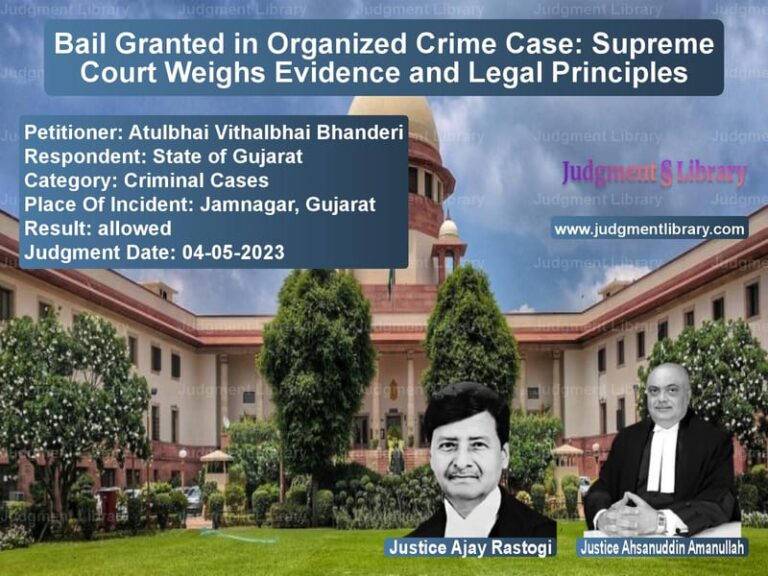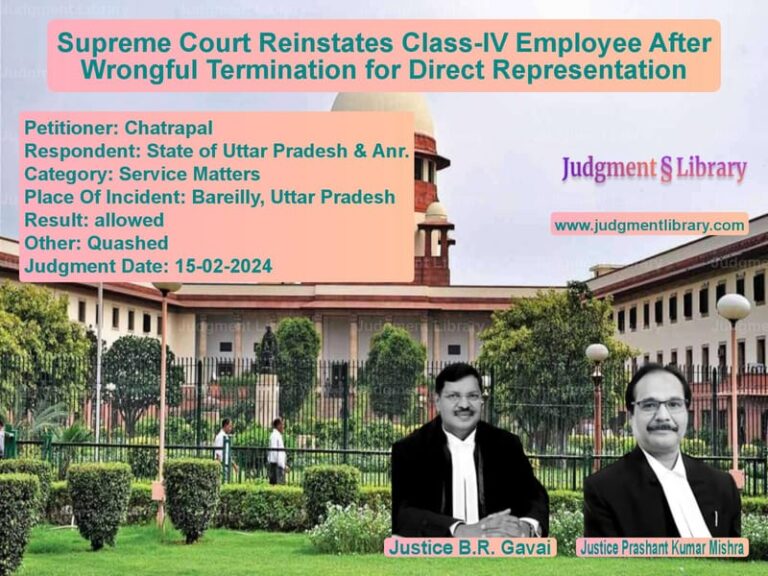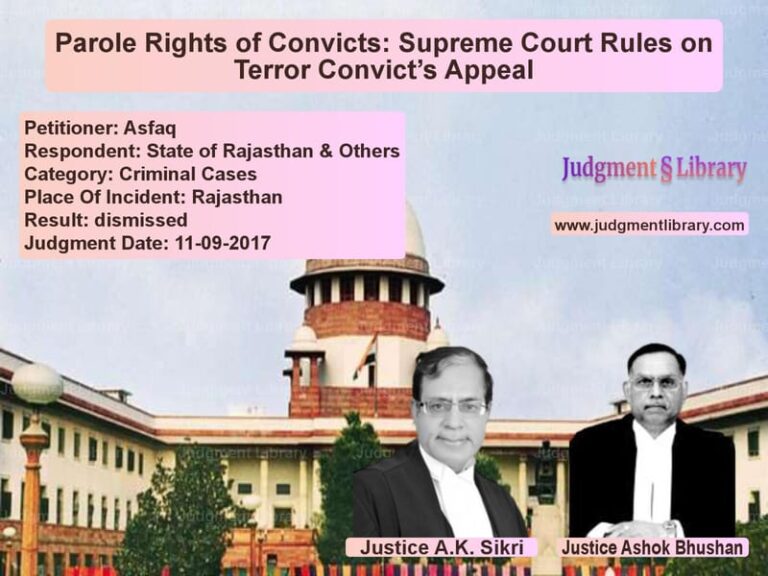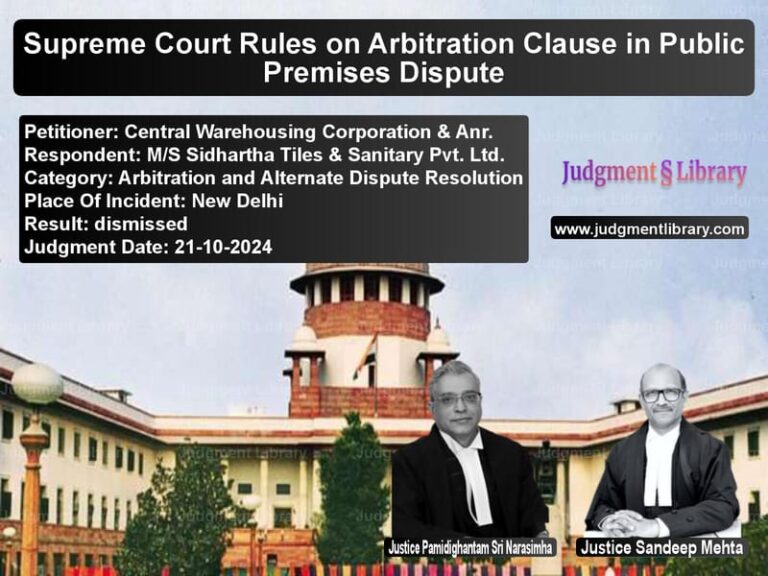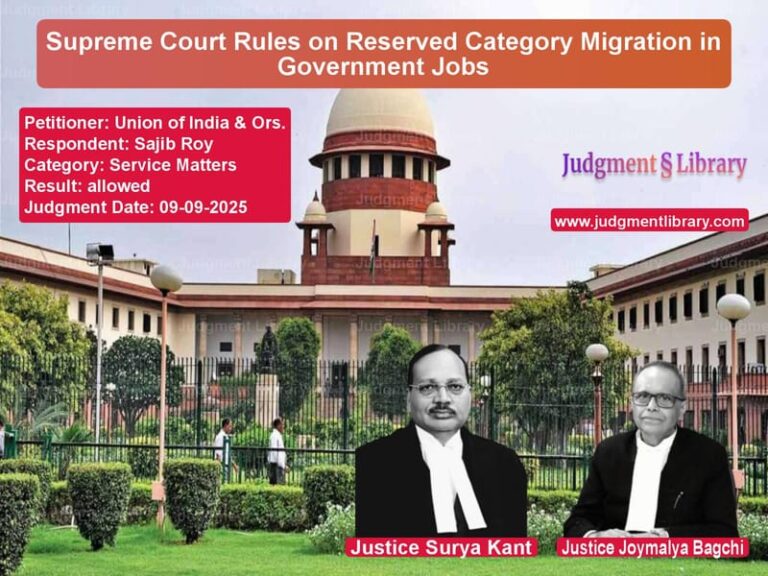Supreme Court Reduces Sentence in Kerala Abkari Act Case: Sunil Kumar v. State of Kerala
The Supreme Court of India recently ruled on a significant case concerning the Kerala Abkari Act in Sunil Kumar v. State of Kerala. The case revolved around the illegal storage of spirit, with the appellant convicted under Section 55(a) of the Abkari Act and Section 309 of the Indian Penal Code (IPC). While upholding the conviction, the Supreme Court reduced the sentence considering the long duration of the case and the appellant’s criminal record.
Background of the Case
The case dates back to June 12, 1999, when the Kerala Police, led by PW-10, conducted a raid in a house rented by the co-accused (A-3 to A-5). The police found 3,000 liters of spirit stored in 86 cans, each containing 35 liters. The contraband was allegedly handed over to Sunil Kumar (A-1) and another co-accused (A-2) to be sold on a commission basis.
As the police arrived, A-1 and A-2 allegedly attempted to commit suicide by inflicting injuries on their wrists, which led to additional charges under Section 309 IPC (attempt to commit suicide).
Following the investigation:
- A-1 (Sunil Kumar), A-2, and A-3 were convicted under the Abkari Act.
- A-1 and A-2 were also convicted under Section 309 IPC.
- The Sessions Court sentenced them to three years of simple imprisonment and imposed a fine of ₹1,00,000 under Section 55(a) of the Abkari Act.
- Under Section 309 IPC, they were ordered to pay a fine of ₹2,000.
Appeal to the Kerala High Court
Sunil Kumar appealed his conviction before the Kerala High Court. After reviewing the case, the High Court made the following modifications:
- While upholding the conviction under Section 55(a) of the Abkari Act, it reduced the sentence from three years to two years of simple imprisonment.
- The conviction under Section 309 IPC was set aside.
- The fine of ₹1,00,000 was retained.
- In case of non-payment of the fine, the default sentence of one year imprisonment remained.
Appeal to the Supreme Court
Sunil Kumar challenged the High Court’s decision in the Supreme Court, arguing that:
- The prosecution had failed to establish direct involvement beyond reasonable doubt.
- The case had been pending for over 23 years, and he had already suffered prolonged legal proceedings.
- There were no prior criminal antecedents against him.
- Given his age and family circumstances, a further reduction in the sentence was warranted.
Respondent’s Arguments
The State of Kerala opposed the appeal, arguing that:
- The seizure of 3,000 liters of spirit was a serious offense that warranted strict punishment.
- The appellant was found in possession of the contraband and was responsible for its illegal distribution.
- Reducing the sentence further would set a bad precedent in Abkari Act violations.
Supreme Court’s Observations
The Supreme Court, after reviewing the case, ruled:
“Taking into consideration the overall aspect of the matter and the fact that 23 years have elapsed from the date of the incident, along with the absence of criminal antecedents, we find it appropriate to modify the sentence.”
The Court noted:
- The case had been pending for over two decades, leading to undue hardship for the appellant.
- While the offense was serious, no additional criminal activity had been reported against the appellant.
- Considering the circumstances, a further modification of the sentence was justified.
Final Judgment
The Supreme Court ruled as follows:
- The conviction under Section 55(a) of the Abkari Act was upheld.
- The sentence was reduced from two years to one year of simple imprisonment.
- The fine of ₹1,00,000 remained unchanged.
- The default sentence for non-payment of the fine was reduced to six months of simple imprisonment.
Conclusion
This ruling reaffirms the Supreme Court’s approach to sentencing proportionality, ensuring that punishment considers the passage of time, the accused’s conduct, and the nature of the offense. While the Court upheld the conviction, it also acknowledged the undue burden of a prolonged trial and adjusted the sentence accordingly.
The decision provides an important precedent for sentencing in cases involving long-pending criminal trials, balancing deterrence with judicial fairness.
Petitioner Name: Sunil Kumar.Respondent Name: State of Kerala & Anr..Judgment By: Justice Ajay Rastogi, Justice C.T. Ravikumar.Place Of Incident: Kerala.Judgment Date: 22-06-2022.
Don’t miss out on the full details! Download the complete judgment in PDF format below and gain valuable insights instantly!
Download Judgment: sunil-kumar-vs-state-of-kerala-&-an-supreme-court-of-india-judgment-dated-22-06-2022.pdf
Directly Download Judgment: Directly download this Judgment
See all petitions in Fraud and Forgery
See all petitions in Drug Possession Cases
See all petitions in Judgment by Ajay Rastogi
See all petitions in Judgment by C.T. Ravikumar
See all petitions in partially allowed
See all petitions in Modified
See all petitions in supreme court of India judgments June 2022
See all petitions in 2022 judgments
See all posts in Criminal Cases Category
See all allowed petitions in Criminal Cases Category
See all Dismissed petitions in Criminal Cases Category
See all partially allowed petitions in Criminal Cases Category



